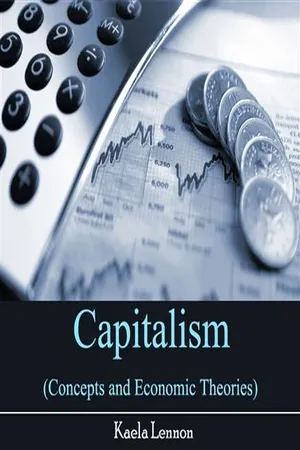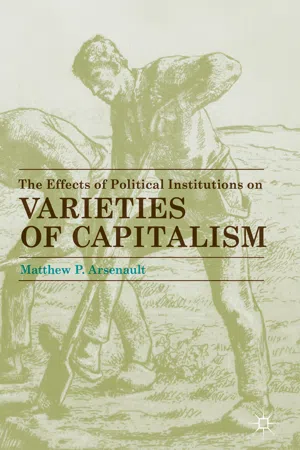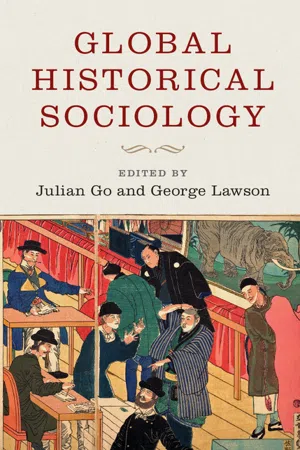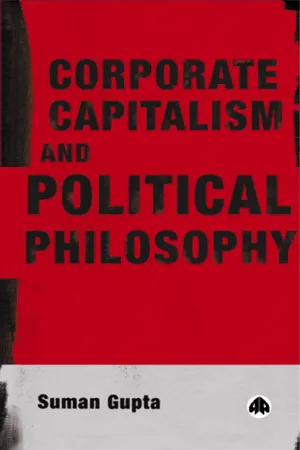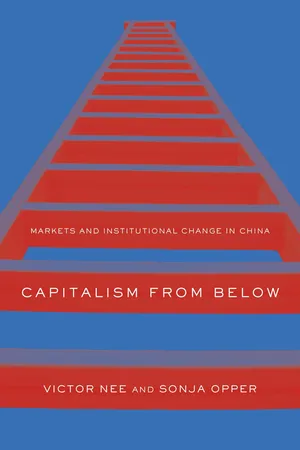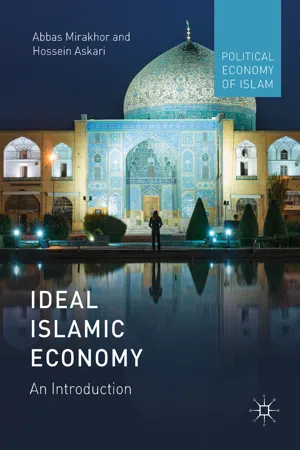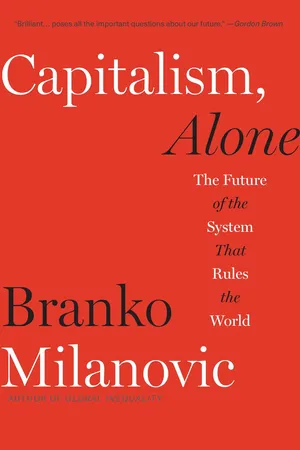Politics & International Relations
Capitalism
Capitalism is an economic system characterized by private ownership of the means of production and the pursuit of profit. In a capitalist system, the market largely determines prices, production, and distribution of goods and services. Competition and the profit motive are key drivers, and the role of government is typically limited to regulating the market and enforcing contracts.
Written by Perlego with AI-assistance
Related key terms
1 of 5
9 Key excerpts on "Capitalism"
- No longer available |Learn more
- (Author)
- 2014(Publication Date)
- Library Press(Publisher)
The designation is applied to a variety of historical cases, varying in time, geography, politics and culture. Some define Capitalism as a system in which all the means of production are privately owned, and some define it more loosely as one in which merely most are in private hands — while others refer to the latter as a mixed economy biased toward Capitalism. More fundamentally, others define Capitalism as a system in which production is carried out to generate profit and is governed by the laws of capital accumulation; regardless of the legal ownership titles. Private ownership in Capitalism implies the right to control property, including the determination of how it is used, who uses it, whether to sell or rent it, and the right to the revenue generated by the property. Economists, political economists and historians have taken different perspectives on the analysis of Capitalism. Economists usually emphasize the degree that government does not have control over markets (laissez faire), and on property rights. Most political economists emphasize private property, power relations, wage labor, class and emphasize ____________________ WORLDTECHNOLOGIES ____________________ Capitalism as a unique historical formation. There is general agreement that Capitalism encourages economic growth. The extent to which different markets are free, as well as the rules defining private property, is a matter of politics and policy, and many states have what are termed mixed economies. Capitalism, as a deliberate economic system, developed incrementally from the 16th century in Europe, although proto-capitalist organizations existed in the ancient world, and early aspects of merchant Capitalism flourished during the Late Middle Ages. Capitalism became dominant in the Western world following the demise of feudalism. Capitalism gradually spread throughout Europe, and in the 19th and 20th centuries, it provided the main means of industrialization throughout much of the world. - No longer available |Learn more
- (Author)
- 2014(Publication Date)
- College Publishing House(Publisher)
The designation is applied to a variety of historical cases, varying in time, geography, politics and culture. Some define Capitalism as a system in which all the means of production are privately owned, and some define it more loosely as one in which merely most are in private hands — while others refer to the latter as a mixed economy biased toward Capitalism. More fundamentally, others define Capitalism as a system in which production is carried out to generate profit and is governed by the laws of capital accumulation; regardless of the legal ownership titles. Private ownership in Capitalism implies the right to control property, including the determination of how it is used, who uses it, whether to sell or rent it, and the right to the revenue generated by the property. Economists, political economists and historians have taken different perspectives on the analysis of Capitalism. Economists usually emphasize the degree that government does not have control over markets (laissez faire), and on property rights. Most political economists emphasize private property, power relations, wage labor, class and emphasize Capitalism as a unique historical formation. There is general agreement that Capitalism encourages economic growth. The extent to which different markets are free, as well as ____________________ WORLD TECHNOLOGIES ____________________ the rules defining private property, is a matter of politics and policy, and many states have what are termed mixed economies. Capitalism, as a deliberate economic system, developed incrementally from the 16th century in Europe, although proto-capitalist organizations existed in the ancient world, and early aspects of merchant Capitalism flourished during the Late Middle Ages. Capitalism became dominant in the Western world following the demise of feudalism. Capitalism gradually spread throughout Europe, and in the 19th and 20th centuries, it provided the main means of industrialization throughout much of the world. - Matthew P. Arsenault(Author)
- 2017(Publication Date)
- Palgrave Macmillan(Publisher)
1 © The Author(s) 2017 M.P. Arsenault, The Effects of Political Institutions on Varieties of Capitalism, DOI 10.1007/978-3-319-50892-4_1 CHAPTER 1 Political Institutions and Varieties of Capitalism A strong correlation exists between political regime and the liberal market economy (LME) and coordinated market economy (CME) dichotomy posed by the varieties of Capitalism (VOC) framework (Gourevitch, 2003). However, debate continues regarding the connection between political institutions and VOC. The purpose of this book is to open the proverbial “black box” and identify the causal mechanisms linking political institu- tions and variation in capitalist systems. Capitalism Adam Smith’s The Wealth of Nations is perhaps the most widely cited study of Capitalism to be published in the past 240 years (1991 [1776]). Smith’s conception of Capitalism is characterized by privately held property and the unrestricted accumulation of additional wealth. Human beings, driven by self-interest, are motivated to maximize personal profit through the pro- ductive use of accumulated property (Sargent, 1999, p. 80). The inborn desire to pursue and maximize individual interest is the driving force of the capitalist system. For Smith, competition is structured within a system of free markets in which buyers and sellers enter commercial transactions free from coercion and government interference. The system of competition regulates the types and quantities of goods produced and the prices at which they are sold. The quantities of goods and services are then efficiently produced 2 with accompanying competitive prices established by the laws of supply and demand. As such, the market serves as a self-regulating mechanism whereby individual profit motive is transformed into socially and econom- ically efficient outcomes (Heilbroner, 1986, p. 57).- eBook - PDF
- Julian Go, George Lawson(Authors)
- 2017(Publication Date)
- Cambridge University Press(Publisher)
Part III Capitalism and Political Economy 7 The Global, the Historical, and the Social in the Making of Capitalism Ho-fung Hung Introduction The rise and triumph of Capitalism has been a focus of historical socio- logical analysis ever since the founders of sociology attempted to explain modernity through tracing the origins of Capitalism in Europe. No matter whether they define Capitalism as a relation of production grounded on waged labor (Marx), as an economic system driven by the urge to accu- mulate wealth for the sake of accumulating wealth (Weber), or as a division of labor that fostered the transition of human society from mechanical to organic solidarity (Durkheim), most studies along these lines continue to compare capitalist development in different countries as if they are isolated processes unfolding independently and confined within the boundary of nation states (e.g., Gerschenkron 1962; Amsden 1989; Brenner 1977). The rise of dependency theory and world systems analysis in the 1970s broke this mold of nation-state-centrism for the first time. Immanuel Wallerstein, who combined the Weberian, Durkheimian, and Marxist views to see Capitalism as an economic system based on the ceaseless accumulation of capital, international division of labor, and transfer of surplus labor value from periphery to core regions, emphasized that since its genesis in the sixteenth century, Capitalism has been an international system. For Wallerstein, Capitalism was global from the start. Pathbreaking as this analysis is, the original world sys- tems paradigm is inadequate in specifying how the three processes of Capitalism – capital accumulation, international division of labor, and surplus appropriation – are interrelated and which one is the most fundamental characteristic of Capitalism. - Suman Gupta(Author)
- 2001(Publication Date)
- Pluto Press(Publisher)
The contemporary corporate capitalist political state is such because it colludes with corporate capitalist processes. I have examined why and how it does so in some detail in the previous sections. When such a corporate capitalist political state finds itself within international politics it has to do essentially what it has done at the domestic level. This means that the entire agenda which is devoted to playing supplicant to and colluding with corporate Capitalism, to trying to increase and intensify and concentrate the interests of large capitalist corporations and significant speculative involvements within the area of its jurisdiction, is transferred to that state’s activities at an international level. The corporate capitalist political state tries, in other words, to use or manipulate interna-tional relations with a view to further facilitating and encouraging corporate capitalist interests that already exist within the people–land–resources under its jurisdiction to grow and stay there. Corporate Capitalist States and International Relations 163 The corporate capitalist political state also carries to the international level its uncomfortable position of bad faith, which can now be seen as bad faith not only to the peoples–lands–resources under its juris-diction, but also to all the other peoples-areas under the jurisdiction of other political states from which it hopes to wrest or cajole con-cessions that would serve corporate capitalist and speculative interests generally – and of course particularly if located within its own precincts. This translated and rather exacerbated position of bad faith has to be managed at the level of international relations itself. The bottom-up regulation which exists, the fact that the gaze of the people–land–resources is constantly fixed on the machina-tions of the corporate capitalist (or indeed any) state, makes the need for such a management of bad faith all the more urgent.- eBook - PDF
Capitalism from Below
Markets and Institutional Change in China
- Victor Nee, Sonja Opper(Authors)
- 2012(Publication Date)
- Harvard University Press(Publisher)
Alternatively, if China’s current form of capital-ism is en route to a full-blown market economy, we should observe constraints on the politicized nature of economic decisions as the role of the state shifts to greater emphasis on building formal market institutions, including property rights and an effective legal system. That political connections grease the wheels in all economic orders is a nearly universal supposition. Economic actors in all economies invest in some form of political capital to secure positional advantages. In market economies too, political actors impose restrictions on economic activities, giving rise to rents that agents compete for. Whether to control entry of new competitors or to promote strategic interests, desire to capture or channel the coercive power of the state motivates the demand for regulation favorable to an industry or firm. In nonmarket economies, production and distribution turn on the 234 Capitalism from below power of principals at the center of a hierarchy. Political actors directly set the prices; hence, agents seeking comparative advantage compete for positional power in the hierarchy, and cultivate political connections. As to the overall economic value of political capital in China given the seemingly incorrigible nature of Communist Party rule, there is no simple answer. Some evidence indicates that state-owned firms with connections to the old political elite perform worse than private firms. Firms with partial state ownership are typically forced to maintain higher employment levels and often serve as tools for private enrichment of politicians. Several studies observe a declining reliance on personal connections (guanxi) in transactions with government. There is also some indication, however, that political capi-tal has a positive impact on the firm’s equity value and performance. - eBook - PDF
Anti-Capitalism
A Marxist Introduction
- Lecio Morais, Alfredo Saad-Filho(Authors)
- 2002(Publication Date)
- Pluto Press(Publisher)
This tendency might be mitigated, however, by the fact that Capitalism is transnational and develops complex interconnectedness between people. The key, however, is to see the independence of the nation state as the principal unit of political organisation and international legitimacy, shaping capitalist competition into a potentially lethal form. There might not be anything inherently warlike about Capitalism, but when it is harnessed to national power and competition it easily becomes so. Here the role of the French government, in particular, in backing and arming the Habyarimana regime in Rwanda that unleashed genocidal violence in 1994 against (mainly) Rwandan Tutsis is an obvious example. So too is the rather more complex US involvement in the Middle East as part and parcel of the Israeli–Palestinian conflict and also the wider social and political conflicts that bred al-Qa’ida terrorism from the late 1990s onwards. Here it is not simply ‘the national state’ but the configuration of political influence on the US state that has held together much of the Middle East in a vice of artificial stability through support to regimes in Egypt and Israel, among others. For surely it is the combined causal powers of Capitalism and national interest (along with a range of other material and ideolo-gical factors) that are realised in arms races and military engagements among capitalist nations. Similarly, it is the combined causal powers of the transition to Capitalism (the prolonged, traumatic ‘moment’ War, Peace and Capitalism 155 of change), the non-linear history of state formation, the diverse roles of non-national collective identities, and the interests of inter-national capital that are realised in the ‘civil wars’ of the world in recent years. Thus, while there has often been a tendency to insist on the total subordination of war and militarism to capitalist production logic, this is never analytically very successful. - eBook - PDF
Ideal Islamic Economy
An Introduction
- Abbas Mirakhor, Hossein Askari(Authors)
- 2017(Publication Date)
- Palgrave Macmillan(Publisher)
The rest is consequences and practical implementation.” Rand then proceeds to define Capitalism as a “social system based on recognition of individual rights, including property rights, in which all property is privately owned.” 75 Rand’s statement summarizes the concern with liberty above all other values for liberalism. From the eighteenth century onwards, traditional or classical liberalism had anchored its political theory on the rights of indi- viduals and the free market. Egalitarian liberalism, which had led to the emergence of welfare state, had taken the arguments of seventeenth- century natural law thinkers on the equality of all humans seriously enough to propose that the idea of equality had to be extended to economic equality—when as a result of operations of free market, part of the society’s membership was deprived of economic resources to meet their basic needs. In the period of post-World War II, a group of thinkers, thinking that egalitarian liberalism and the welfare state and its institutional structure had undermined traditional liberal values, began a movement in 1947 referred to as Mont Pelerin Society (MPS), under the leadership of Friedrich Von Hayek, Ludwig Von Mises, Frank Knight, George Stigler and Karl Popper. MPS was dedicated to reviving traditional liberalism, in particular focused on reducing the role of government in the economy, as opposed to the egalitarian liberalism that was then the dominant ideology. The first meeting of the MPS was attended by 36 influential scholars, who would manage to make neoliberalism the dominant ideology of political regime of 58 A. MIRAKHOR AND H. ASKARI President Reagan in the USA and of Prime Minister Margret Thatcher in the UK. A number of economists, members of MPS, have gone on to receive the Nobel Memorial Prize in Economic Science, including Friedrich Von Hayek, Milton Friedman, George Stigler, Maurice Allais, James M. Buchanan, Ronald Coase, Gary Becker and Vernon Smith. - eBook - PDF
Capitalism, Alone
The Future of the System That Rules the World
- Branko Milanovic(Author)
- 2019(Publication Date)
- Belknap Press(Publisher)
Share of workers employed by SOEs in total urban employment in China, 1978–2016 Data source: National Bureau of Statistics, Statistical Yearbooks, various years. Data kindly provided by Haiyan Ding. P OL I T IC A L C A PI T A L ISM 91 of agricultural products, and 8 1 percent of production materials (Pei 2006, 125). Today even a higher percentage of prices are market determined. 3.3 Key Features of Political Capitalism 3.3a Three Systemic Characteristics and Two Systemic Contradictions Max Weber’s de fi nition of politically motivated Capitalism in The Protes-tant Ethic and the Spirit of Capitalism was “the use of political power to achieve economic gains.” In Weber’s words, “ Th e Capitalism of promoters, large-scale speculators, concession hunters and much modern fi nancial cap-italism even in peace-time, but, above all, the Capitalism especially con-cerned with exploiting wars, bears this stamp [acquisition of wealth by force, political connection, or speculation] even in modern Western coun-tries, and some . . . parts of large-scale international trade are closely re-lated to it” (1992, 21). Weber developed this idea further in Economy and Society : “Political Capitalism has existed . . . wherever there has been tax farming, the pro fi table provision of the state’s political needs, war, piracy, large-scale usury, and colonization” (1978, 480). Th e states that practice political Capitalism today, especially China, Vietnam, Malaysia, and Singapore, have modi fi ed this model by putting a highly e ffi cient and technocratically savvy bureaucracy in charge of the system. Th is is the first important characteristic of the system—that bu-reaucracy (which is clearly the primary bene fi ciary of the system) has as its main duty to realize high economic growth and implement policies that allow this goal to be achieved. Growth is needed for the legitimization of its rule.
Index pages curate the most relevant extracts from our library of academic textbooks. They’ve been created using an in-house natural language model (NLM), each adding context and meaning to key research topics.
